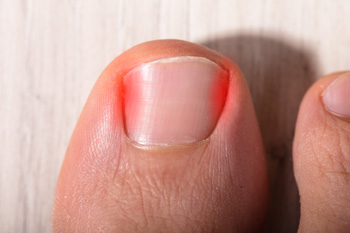
Ingrown toenails, a common foot ailment, occur when the toenail's edge grows into the surrounding skin, often causing pain, redness, and swelling. This condition can affect any toe but is most frequently seen on the big toe. The causes of ingrown toenails are diverse, typically stemming from improper nail trimming, where cutting the nail too short or rounding its edges can encourage it to grow into the skin. Wearing ill-fitting shoes that compress the toes or trauma to the nail can also trigger ingrowth. Additionally, some individuals may have a genetic predisposition to ingrown toenails due to the natural shape of their nails. Hygiene also plays a role, as fungal infections can thicken the nail, making it more likely to become ingrown. If not addressed promptly, ingrown toenails can lead to infections, making early care essential for foot health. If you have developed an ingrown toenail, it is strongly suggested that you are under the care of a podiatrist who can effectively treat this condition.
Ingrown toenails can become painful if they are not treated properly. For more information about ingrown toenails, contact Dr. Kendall Blackwell of InStride Wilson Podiatry Associates. Our doctor can provide the care you need to keep you pain-free and on your feet.
Ingrown Toenails
Ingrown toenails occur when a toenail grows sideways into the bed of the nail, causing pain, swelling, and possibly infection.
Causes
Prevention
Because ingrown toenails are not something found outside of shoe-wearing cultures, going barefoot as often as possible will decrease the likeliness of developing ingrown toenails. Wearing proper fitting shoes and using proper cutting techniques will also help decrease your risk of developing ingrown toenails.
Treatment
Ingrown toenails are a very treatable foot condition. In minor cases, soaking the affected area in salt or antibacterial soaps will not only help with the ingrown nail itself, but also help prevent any infections from occurring. In more severe cases, surgery is an option. In either case, speaking to your podiatrist about this condition will help you get a better understanding of specific treatment options that are right for you.
If you have any questions please feel free to contact our office located in Wilson, NC . We offer the newest diagnostic and treatment technologies for all your foot and ankle needs.